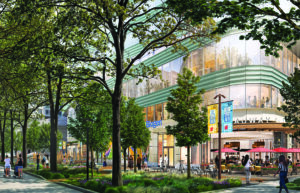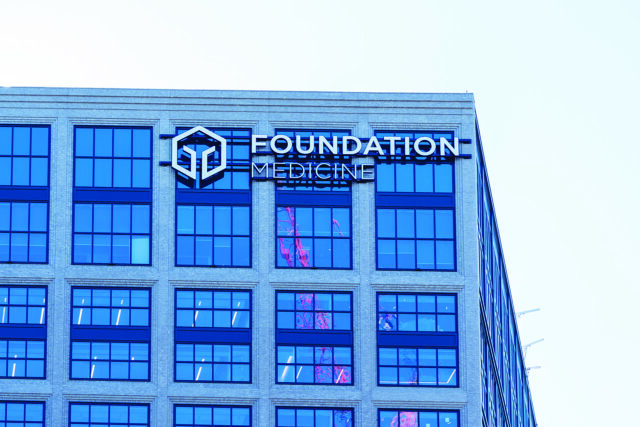
Biogen held a ceremonial groundbreaking this moth for its new, 585,000-square-foot headquarters tower in Cambridge’s Kendall Square. Image courtesy of Elkus Manfredi Architects
Little tiny green shoots are poking up here and there – in Waltham, Watertown, Cambridge and elsewhere around Greater Boston.
Actual lease deals within a life science sector whose vacancy rates are hovering at stomach-churning highs across the region, from about 20 percent in Cambridge to as high as 61 percent in the inner suburbs.
No one is saying the local biotech real estate sector is poised for imminent full-scale rebound.
If anything, most industry observers believe the regional market for lab space will probably get worse before it gets better, largely due to ongoing capital restraints and past overbuilding of facilities that’s flooded the market with empty life-science buildings galore.
And millions more square feet of new lab space are expected to hit the market over the coming year.
But experts who spoke to Banker & Tradesman for this story say they are heartened, at least a little bit, by recent leasing activity that signals that not all is doom and gloom.
19M SF Available Space
There’s Foghorn Therapeutic’s recent announcement that it planned to move from Cambridge to about 72,000 square feet of space at 99 Coolidge Ave. in Watertown.
There’s Intellia Therapeutics’ recent lease deal for about 101,240 square feet at 400 Technology Square in Cambridge, as part of an overall real estate consolidation move by the firm.
And then there’s Biogen’s ceremonial groundbreaking earlier this month for its new 585,000-square-foot headquarters building at 75 Broadway, on the Volpe site in Cambridge’s Kendall Square.
Combined, it’s not a tremendous amount of activity, considering there’s about 19 million square feet of available life-science space remaining across the region, according to some industry estimates.
But at least it’s activity.
“There are definitely some green shoots out there,” said Riley McMullan, senior research manager at commercial brokerage Cushman & Wakefield.
Leasing Activity Ahead of 2024
McMullan noted that so far this year leasing activity in the region is running more than 100,000 square feet ahead of 2024’s full-year total.
In some parts of the Route 128 area, leasing activity so far this year is already 10 percent ahead of lease activity through all of 2024, according to McMullan.
Mark Fallon, director of research and strategy at commercial brokerage Hunneman, said the region’s overall life-science vacancy rate – now hovering between 25 percent and 30 percent, according to most brokerage researchers – will probably keep rising in coming months and quarters.
Yet there’s a sliver of good news in the stats.
“The growth of the vacancy rate has slowed,” said Fallon. “We aren’t seeing an actual reversal of conditions. The fundamentals are still worsening. But it’s not worsening at its old rate. We’re seeing a little more activity.”

Toymaker Hasbro recently inked a deal to house its new headquarters across 265,000 square feet of subleased space in biotech Foundation Medicine’s nearly 600,000-square-foot headquarters building at 400 Summer St. in Boston’s Seaport District. The biotech company put the brakes on plans for rapid growth in 2023. iStock photo
Seaport Struggling
One submarket that’s really struggling is Boston’s Seaport District, where the vacancy rate as of the end of the second quarter stood at 44.1 percent, according to the most recent available Colliers data.
Other industry estimates put Seaport’s vacancy rate slightly lower, but there’s no doubt the Seaport has gotten hammered by the life-science downturn. Asking rent prices, now at about $89.61 per square foot, down by 20 percent since 2022, according to data from commercial brokerage CBRE.
However, industry experts say it’s only a matter of time before Seaport sees an uptick in leasing activity as well.
Well-Positioned in Waltham-Watertown
One of the bright spots in the region has been Waltham, where leasing activity has definitely picked up so far this year, according to sources.
In fact, Cushman & Wakefield’s McMullan says six of the region’s 11 lease deals over 30,000 square feet this year have occurred in Waltham.
They include AbbVie Inc.’s 83,549-square-foot renewal lease at 830 Winter St. in Waltham and AVS’s 37,811-square-foot lease at 180 3rd Ave. in Waltham.
Other smaller Waltham deals so far this year include 26,000 square feet of space leased by General Biologics and 22,000 square feet of space taken by X-Chem Pharmaceuticals, according to Cresa.
“Waltham is doing very well – with both tech companies and life-science companies,” said John Coakley, managing principal at tenants-only brokerage Cresa. “Waltham is positioned well. It’s at that convenient mid-point between Boston-Cambridge and suburbs [to the west].”
And don’t forget neighboring Watertown, where Novartis subsidiary Mariana Oncology recently signed a 30,000-square-foot lease at 500 Forge Road, expanding its presence in Watertown.
Cambridge Still Queen
Only a few years ago, it was almost impossible to find life-science space in Cambridge, home to MIT, Harvard University and other great research institutes, such was the demand. Before the COVID-19 pandemic, Cambridge’s vacancy rate was hovering around 1 percent.
But even Cambridge has suffered during the lengthening life science downturn, with its overall second-quarter vacancy rate hovering between about 19 to 23 percent, depending on the brokerage report.
Meanwhile, the average asking rent in Cambridge fell by 270 basis points in the second quarter, to $95.29 per square foot, compared to first-quarter data, according to CBRE research.
Average asking rents in East Cambridge were about $105 as of the second quarter, down 100 basis points from the previous quarter, the brokerage said.
But Cambridge easily remains the strongest life science real estate submarket in Greater Boston – and a submarket many biopharma companies would love to be in, industry officials say.
Besides the recent Intellia and Biogen real estate moves in Cambridge, City Therapeutics, a RNAi biotech launched late last year, recently signed a 44,336-square-foot lease deal at 399 Binney St.
City Therapeutics was co-founded by John Maraganore, the founding CEO Alnylam Pharmaceuticals, also in Cambridge.
Because of its continuing allure, Cambridge is in good shape if and when an industry recovery occurs, said Hunneman’s Fallon.
“Logically, you’d think many companies would leave or avoid the most expensive [life-science] market in the area,” he said. “But Cambridge is where a lot of people will flock to as soon as they get that capital. They want to be in Cambridge.”






